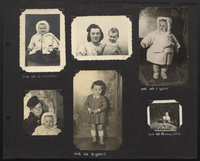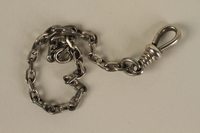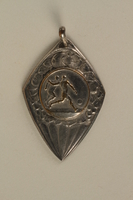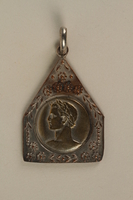Overview
- Brief Narrative
- National deaf-mute championship basketball medal awarded in 1938 to Max Feld. In 1938, he left Germany for Paris to be with Raisa Steinberg, whom he had met when they were students at the Israelite School for the Deaf in Berlin. They married in 1939, and had a daughter, Esther, in 1940. Paris was occupied by the Germans in the summer of 1940 and foreign Jews were targeted for arrest. In May 1941, Max was sent to Beaune-la-Rolande interment camp; in July 1942, he was deported to Auschwitz-Birkenau concentration camp. Raisa went into hiding with Esther in July 1942 in the countryside outside Paris. They returned to Paris after it was liberated by Allied Forces on August 15, 1944. Max was reported as missing. Several years later, Raisa learned that Max had been killed in Auschwitz-Birkenau in September 1942.
- Date
-
commemoration:
1938
- Geography
-
use:
Paris (France)
- Credit Line
- United States Holocaust Memorial Museum Collection, Gift of Esther Feld Weisel
- Contributor
-
Subject:
Esther Weisel
Subject: Max Feld
- Biography
-
Esther Feld was born on December 22, 1940, in Paris, France, to Max and Raisa (Rose) Steinberg Feld. Max, born on January 6, 1915, in Berlin, Germany, and Raisa, born on April 1, 1917, in Kiev, Russia (Ukraine), had met as students at the Israelite School for the Deaf in Berlin, Germany. Raisa had emigrated with her family from Germany to Paris in 1938. Max joined her there and they married in December 1939. After Paris fell to the Germans on June 14, 1940, anti-Jewish regulations were enacted and foreign Jews were targeted for arrest. Her father was deported to Beaune-la-Rolande internment camp in May 1941 and transported to Birkenau concentration camp in July 1942. Her mother was assigned to a clothing factory, sewing fur coats for German officers.
In July 1942, a French policeman warned Raisa that she should leave Paris. Raisa and Esther left Paris with Raisa’s mother and sister, Tauba and Sara Steinberg. The family had a summer home in nearby Villepointe and after staying at multiple farmhouses in the countryside, they decided to hide there. Esther was put in the care of a babysitter and then a non-Jewish couple, Monsieur and Madame Trene, a nurse. Raisa, Tauba, and Sara hid in the basement under a vault and a trap door. They lived this way for about nine months, until American soldiers came into the house in the summer of 1944 to tell them that they were free. Madame Trene did not want to give Esther back to Raisa. But after repeated demands by Raisa, Madame Trene thrust Esther at Raisa. The family returned to Paris where they found that their apartment had been emptied of all its contents. Max never returned and it was not until many years later that they learned that at age twenty-seven, he had been killed in Auschwitz-Birkenau in September 1942.
In 1947, the Venezuelan government announced that they would accept 2000 Jewish refugees from Paris. Esther, Raisa, Tauba, and Sara emigrated that year. In 1949, Esther and Raisa moved to New York. Raisa married Ted Rosman. Esther moved to California in 1963, where she married and had two sons.
Max Feld was born on January 6, 1915, in Berlin, Germany, to Wolf, born September 18, 1891, in Lutowska, Poland, and Martha Eisenberg, born February 1, 1894 in Dukla, Poland. His father delivered medical supplies and his mother sewed raincoats. Max had two younger brothers, Alfred, born on March 15, 1924, and Sidney (Sigi), born on June 4, 1925. Max was born deaf and his parents sent him the Israelite School for the Deaf (Hebrew School for the Deaf) in Berlin, Germany. He met Raisa Steinberg, born April 1, 1917, in Kiev, USSR (Ukraine), a fellow student, in 1928.
Max and Raisa stayed in contact and when Raisa left Poland in 1938 to join her parents in Paris, France, she stopped n Berlin to visit Max. Raisa’s parents had emigrated from Poland because the increasing anti-Semitism was making it difficult to live there. At the end of the year, Max’s family decided to leave Nazi Germany for South America. They stopped in Paris to visit the Steinbergs. Max and Raisa became engaged. Raisa’s parents did not want her to go so far away, so Max remained with the Steinberg’s, while his family continued on their journey. They would eventually settle in the United States. Raisa’s father, Michel, helped Max get a job as a dental technician. Max and Raisa married on December 26, 1939. In June 1940, France surrendered to Germany. Paris was occupied by the Germans and ant-Jewish regulations were put in place restricting their movements, and establishing curfews and food rationing. Foreign Jews were especially vulnerable and often arrested and imprisoned. Max and Raisa’s daughter, Esther, was born on December 22, 1940. Max was deported to Beaune La Rolande internment camp on May 1941. Raisa and Esther were able to visit him three times before he was sent to Pithiviers on June 6, 1942. He was deported to Auschwitz-Birkenau concentration camp in Poland on July 19 and killed that September.
Physical Details
- Language
- French
- Classification
-
Awards
- Category
-
Medals
- Object Type
-
Sports--Medals (lcsh)
- Physical Description
- Silver colored metal, circular medallion with a relief image of a man in a sleeveless sports shirt and shorts leaping with a ball in his outstretched arms to make a basket. The background has a sectional pattern of curved, raised lines. In the upper left are 2 enameled letters F, one blue, one red. On the lower right are 2 enameled letters: an F in white and a B or possibly P in red. At the top is an opening with a suspension ring. The reverse has engraved French text.
- Dimensions
- overall: Height: 1.250 inches (3.175 cm) | Width: 0.875 inches (2.223 cm) | Depth: 0.125 inches (0.318 cm) | Diameter: 0.900 inches (2.286 cm)
- Materials
- overall : metal, enamel paint
- Inscription
- back, engraved : COUPE NATIONALE / DES / SILENCIEUX / ETOILE SPORTIVE / DES / SOURDS-MUETS / CHAMPION 1938 [SILENT STAR NATIONAL CUP DEAF-MUTE SPORTS CHAMPION 1938]
Rights & Restrictions
- Conditions on Access
- No restrictions on access
- Conditions on Use
- No restrictions on use
Keywords & Subjects
Administrative Notes
- Legal Status
- Permanent Collection
- Provenance
- The deaf-mute sports medallion was donated to the United States Holocaust Memorial Museum in 2005 by Esther Feld Weisel, the daughter of Max Feld.
- Record last modified:
- 2024-02-21 07:11:17
- This page:
- https://collections.ushmm.org/search/catalog/irn44077
Download & Licensing
In-Person Research
- By Appointment
- Request 21 Days in Advance of Visit
- Plan a Research Visit
- Request to See This Object
Contact Us
Also in Max Feld and Rose Feld-Rosman collection
The collection consists of artifacts, documents, and photographs relating to the experiences of Max Feld and Raisa Steinberg in Germany and Poland before the Holocaust and in France with their daughter, Esther, during and after the Holocaust.
Date: 1907-1957

Max and Rose Feld papers
Document
The Max and Rose Feld papers contain documents and photographs relating to Max and Rose Feld, a deaf married couple and their daughter Esther. The Feld family lived in Paris, France, before Max was taken to Beaune-la-Rolande before being sent to Auschwitz. Rose and Esther were kept hidden by a number of families in Paris and the countryside, before the war ended and they immigrated to the United States. Included in the collection are various items relating to identification and immigration, such as marriage certificates, identity cards, passports, visa applications, affidavits, and other items. Also included are photographs of the Feld family, as well as Max and Rose’s parents prior to the war, and of Esther as a child. The Max and Rose Feld papers contain documents and photographs from their time at school in Berlin, to living married in France, to Rose and Esther’s time in hiding from the Germans and subsequent immigration to United States after the war. Included in the documents are birth certificates for Esther, marriage certificates for Max and Rose, and numerous identification documents such as work passes, membership cards, and Rose’s Polish passport. The immigration papers include applications for visas, an affidavit, and Rose’s naturalization certificate for the United States. Other items include documents pertaining to Max Feld’s death in Auschwitz and receiving reparations, an insurance registration card for Rose, and a copy of the bylaws for the Organization of Jewish Deaf in Berlin. The photographs in this collection are primarily of the Feld family, with some photos of Max and Rose and Esther as a newborn. Other photos are of Max Feld’s parents and brothers, and Rose’s parents and sisters, photos of Max while he was imprisoned in the Beaune-la-Rolande internment camp. Some photos are post-World War II, and show Rose along with her sister, mother, and Esther traveling to the United States and Caracas, Venezuela. The oversized folder contains several sheets from a photo album of Esther as a child in France, South America and the United States.

Silver metal cable link chain used to hold sports medals awarded to a German Jewish deaf-mute athlete
Object
Chain used by the Feld family to hold sports medals awarded to Max Feld. Max competed in several deaf-mute athletic competitions in the 1930s in Berlin and Paris. In 1938, he left Germany for Paris to be with Raisa Steinberg, whom he had met when they were students at the Israelite School for the Deaf in Berlin. They married in 1939, and had a daughter, Esther, in 1940. Paris was occupied by the Germans in the summer of 1940 and foreign Jews were targeted for arrest. In May 1941, Max was sent to Beaune-la-Rolande interment camp; in July 1942, he was deported to Auschwitz-Birkenau concentration camp. Raisa went into hiding with Esther in July 1942 in the countryside outside Paris. They returned to Paris after it was liberated by Allied Forces on August 15, 1944. Max was reported as missing. Several years later, Raisa learned that Max had been killed in Auschwitz-Birkenau in September 1942.

French Deaf-Mute National Cup soccer medal awarded to a German Jewish athlete
Object
FSSMF [La Fédération Sportive des Sourds-Muets de France (French Deaf Mute Sports Federation)] National Cup soccer medal awarded in 1938 to Max Feld. In 1938, he left Berlin for Paris to be with Raisa Steinberg, whom he had met when they were students at the Israelite School for the Deaf in Berlin. They married in 1939, and had a daughter, Esther, in 1940. Paris was occupied by the Germans in the summer of 1940 and foreign Jews were targeted for arrest. In May 1941, Max was sent to Beaune-la-Rolande interment camp; in July 1942, he was deported to Auschwitz-Birkenau concentration camp. Raisa went into hiding with their 1.5 year old daughter, Esther, in July 1942 in the countryside outside Paris. They returned to Paris after it was liberated by Allied Forces on August 15, 1944. Max was reported as missing. Several years later, Raisa learned that Max had been killed in Auschwitz-Birkenau in September 1942.

Deaf-mute sports team medal awarded to a German Jewish athlete
Object
Sports medal awarded in 1938 to Max Feld. In 1938, he left Germany for Paris to be with Raisa Steinberg, whom he had met when they were students at the Israelite School for the Deaf in Berlin. They married in 1939, and had a daughter, Esther, in 1940. Paris was occupied by the Germans in the summer of 1940 and foreign Jews were targeted for arrest. In May 1941, Max was sent to Beaune-la-Rolande interment camp; in July 1942, he was deported to Auschwitz-Birkenau concentration camp. Raisa went into hiding with Esther in July 1942 in the countryside outside Paris. They returned to Paris after it was liberated by Allied Forces on August 15, 1944. Max was reported as missing. Several years later, Raisa learned that Max had been killed in Auschwitz-Birkenau in September 1942.
Unused yellow cloth Star of David badge with Juif for Jew issued in Paris
Object
Unused Star of David badge owned by 25 year old Raisa Steinberg Feld in Paris, France, in May 1942. Jews in France were required to wear these on their outer clothing at all times after May 1942; badges were often cut from a pre-printed roll. After Paris was occupied by Germany in May 1940, foreign Jews were in danger of arrest and imprisonment. Raisa and her husband, Max, both deaf, were Jewish refugees from Poland and Germany. In May 1941, Max was arrested and, in July 1942, deported to Auschwitz-Birkenau concentration camp. Raisa went into hiding with their 1.5 year old daughter, Esther, her sister, and her mother in the countryside outside Paris. They returned to Paris several months after it was liberated by Allied Forces on August 15, 1944. Max was reported as missing. Several years later, Raisa learned that Max had been killed in Auschwitz-Birkenau in September 1942.
Yellow cloth Star of David badge with Juif for Jew worn by a Polish refugee in Paris
Object
Star of David badge worn by 25 year old Raisa Steinberg Feld in Paris, France, from June 1942. Jews in France were required to wear these on their outer clothing at all times after May 1942; badges were often cut from a pre-printed roll. After Paris was occupied by Germany in May 1940, foreign Jews were in danger of arrest and imprisonment. Raisa and her husband, Max, both deaf, were Jewish refugees from Poland and Germany. In May 1941, Max was arrested and, in July 1942, deported to Auschwitz-Birkenau concentration camp. Raisa went into hiding with their 1.5 year old daughter, Esther, her sister, and her mother in the countryside outside Paris. They returned to Paris several months after it was liberated by Allied Forces on August 15, 1944. Max was reported as missing. Several years later, Raisa learned that Max had been killed in Auschwitz-Birkenau in September 1942.
Watercolor greeting card of his barracks at Beaune-la-Rolande created by a camp inmate
Object
New Year’s greeting card created by 27 year old Max Feld of the barracks where he lived while imprisoned at Beaune-la-Rolande internment camp in France from 1941-1942. Max made the card for his wife, Raisa, and their daughter, Esther, and it includes a handwritten message wishing them “a happy and healthy year.” After Paris was occupied by Germany in May 1940, foreign Jews were in danger of arrest and imprisonment. Max and his wife, Raisa, both deaf, were Jewish refugees from Germany and Poland. In May 1941, Max was arrested and, in July 1942, deported to Auschwitz-Birkenau concentration camp. Raisa went into hiding with their 1.5 year old Esther, her sister, and her mother in the countryside outside Paris. They returned to Paris several months after it was liberated by Allied Forces on August 15, 1944. Max was reported as missing. Several years later, Raisa learned that Max had been killed in Auschwitz-Birkenau in September 1942.



